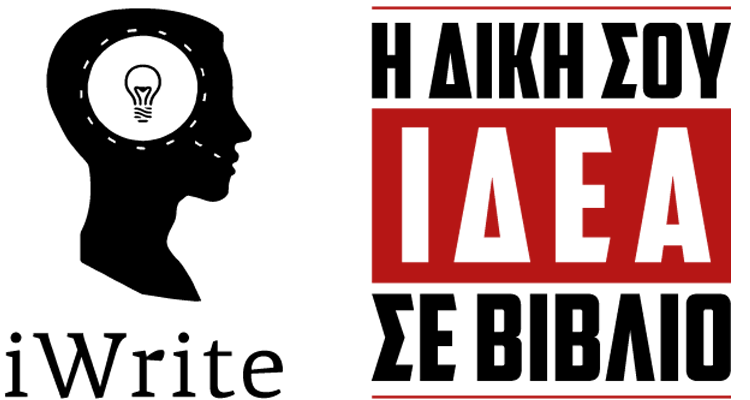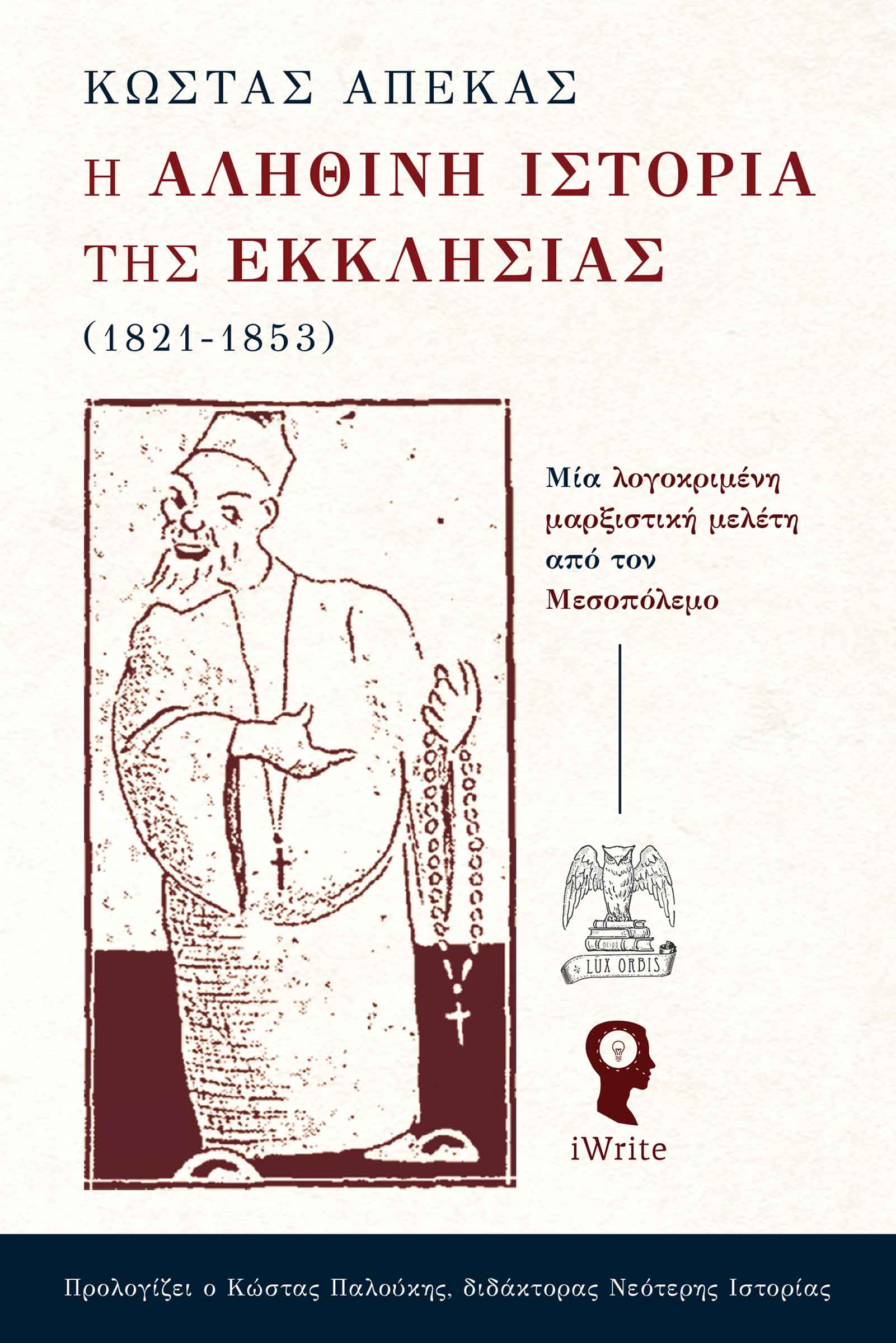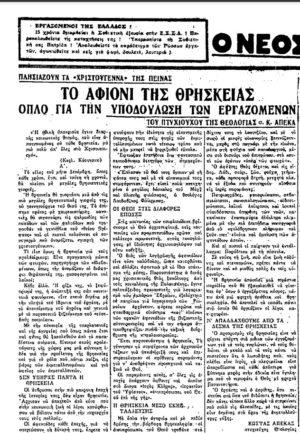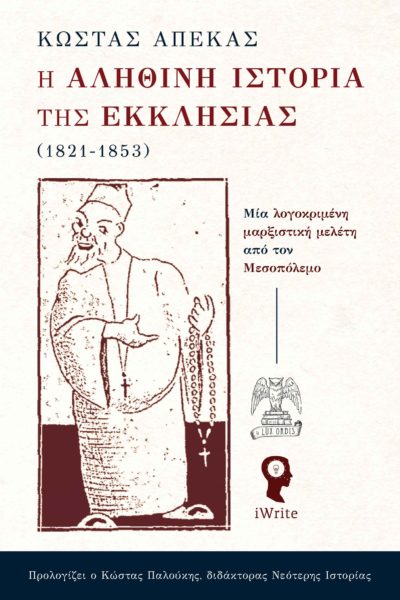Το απαγορευμένο βιβλίο – από τον Κώστα Απέκα – που ρίχνει φως σε Εκκλησία και Αριστερά
Η Αριστερά, ο Σοσιαλισμός και η Εκκλησία
Ένα βιβλίο έρχεται πολλές δεκαετίες μετά για να ρίξει άπλετο φως σε ότι αφορά την σύγκρουση που έχουν η Εκκλησία με την Αριστερά. Η εμφάνιση του σοσιαλισμού στην Ελλάδα δεν συνδέθηκε απαραίτητα με την απόρριψη της θρησκείας ή έναν έντονο αντικληρικαλισμό. Αντίθετα, από τα τέλη του 19ου αιώνα και μέχρι την ίδρυση του ΣΕΚΕ, το 1918, οι σοσιαλιστές διανοούμενοι της εποχής συνδύαζαν το κοινωνικό μήνυμα του σοσιαλισμού με το κοινωνικό μήνυμα του χριστιανισμού. Στο ιδρυτικό κείμενο του ΣΕΚΕ ουσιαστικά διατυπώνονται για πρώτη φορά στην ελληνική πολιτική ιστορία από ένα κόμμα μια σειρά από δημοκρατικά φιλελεύθερα και ριζοσπαστικά αιτήματα που αφορούν τη σχέση εκκλησίας και Αριστεράς, κράτους και κοινωνίας.
Συγκεκριμένα, στο σημείο 11 των θέσεων της διακήρυξης αναφέρεται το αίτημα για «ελευθερία πάσης θρησκείας χωρίς την ανάγκην επισήμου θρησκείας». Επιπλέον τονίζεται η ανάγκη «η θρησκεία να αναγνωρισθή ως ιδιωτική υπόθεσις και η εκκλησίας ως ιδιωτικόν ίδρυμα». Στην ίδια κατεύθυνση σε ότι αφορά την Εκκλησία και την Αριστερά τίθεται το ζήτημα της απαγόρευσης «εις τους κληρικούς να διδάσκουν εις τα σχολεία», η «ενέργεια των ληξιαρχικών πράξεων» να διενεργείται «υπό της τοπικής διοικήσεως». Επιπλέον προτείνεται η «κατάργησις όλων των δημοσίων νόμων δι’ εκκλησιαστικούς και θρησκευτικούς σκοπούς επιβαλομένων φόρων», ενώ τέλος διατυπώνεται το αίτημα της καθιέρωσης «του πολιτικού γάμου». Ωστόσο, σε κανέναν επίσημο κείμενο δεν θα επανεμφανιστούν τα σχετικά αιτήματα παρότι το κόμμα κινείται προς πιο ριζοσπαστικές τάσεις.
Η Αριστερά και ο Λένιν ανοίγει ένα νέο δρόμο για τον διαχωρισμό κράτους με την Εκκλησία
Θα πρέπει να περιμένουμε τα τέλη του 1926 και τη δημοσίευση του άρθρου του Λένιν «Σοσιαλισμός και θρησκεία, χωρισμός της εκκλησίας από το κράτος» για να διατυπωθεί ουσιαστικά πρώτη φορά το αίτημα του διαχωρισμού. Το άρθρο αυτό θα πρέπει να θεωρηθεί τομή στην κομμουνιστική γραμματεία και πρακτική γύρω από τα θέματα που αφορούν Εκκλησία και Αριστερά. Κηρύσσεται ανοιχτά η πάλη στη θρησκεία και υπέρ της αθεΐας καθώς και η διάκριση του κράτους από την εκκλησία. Το κομμουνιστικό κόμμα αναγνωρίζει τη σημασία μιας «από τα πάνω» προπαγάνδας μέσα από έναν «εκπαιδευτικό διαφωτισμό» των εργατών, αλλά εστιάζει κυρίως στην ίδια την εργατική εμπειρία η οποία θα επιτρέψει στους εργάτες να γίνουν δεκτικοί στην προπαγάνδα. Για αυτό το λόγο, αποσκοπεί πρωτίστως στη διάκριση του κράτους από την εκκλησία και την εξατομίκευση του θρησκευτικού αισθήματος.
Το ΚΚΕ στα συνεδριακά κείμενά του δεν ασχολείται με το εκκλησιαστικό ζήτημα.
Σταδιακά όμως ο αντικληρικαλισμός θα αρχίσει να εντείνεται στην αρθρογραφία του Ριζοσπάστη. Σχολιάζεται η σεξουαλική παρενόχληση παιδιών από ιερείς με τίτλους όπως «τα όργια ρασοφόρων» (1928), η «θαυμαστή συνεργασία ανάμεσα σε αστυνομία και εκκλησία» (1929), ο κεντρικός ρόλος του ιερέα στα πράγματα ενός χωριού και η χρηματική εκμετάλλευση των χωρικών μέσα από ανταποκρίσεις με τίτλους όπως «τα έργα των αντιπροσώπων του θεού» (1929) ή «οι παπάδες λακέδες των πλουσίων (1930). Μάλιστα, κατά τη διάρκεια της αντιπαράθεσης ανάμεσα στην κυβέρνηση Βενιζέλου και της Ιεράς Συνόδου για το ζήτημα της εκκλησιαστικής περιουσίας θα τοποθετηθεί για πρώτη φορά σε αυτό το θέμα. Συγκεκριμένα, θα υποστηρίξει «την άμεση απαλλοτρίωση όλης της μοναστηριακής περιουσίας δίχως καμία απολύτως αποζημίωση».
Ο κομμουνιστικός αντικληρικαλισμός στην Ελλάδα και η στάση που κρατά η Αριστερά απέναντι στην Εκκλησία
Οι αρχειομαρξιστές ασχολήθηκαν επίσης με το ζήτημα της θρησκείας. Στα κατασχεθέντα έντυπα από το αρχειομαρξιστικό Κόκκινο Σχολείο στη συνοικία της Αγίας Φωτεινής στην Θεσσαλονίκη τον Ιανουάριο του 1931 εντοπίστηκε ένα πρόχειρο 24σέλιδο ιστορικό δοκίμιο με τίτλο «Η εκκλησία όργανον της αρχούσης τάξεως» όπου εξιστορείται η ιστορία της εκκλησίας από την βυζαντινή εποχή μέχρι τότε. Στην εφημερίδα Πάλη των Τάξεων θα κυκλοφορήσει μια σειρά άρθρων με θέμα «Πατρίδα, θρησκεία, οικογένεια». Σε αυτά παρουσιάζεται η βασική διαφωτιστική και αντικληρικαλιστική άποψη των κομμουνιστών της εποχής την οποία θα συναντήσουμε και στον Κώστα Απέκα. Σύμφωνα με αυτή, στις κοινωνικές διαμάχες του μεσαίωνα «η Εκκλησία έπαιζε πάντα ρόλο αντιδραστικό στην Αριστερά».
Η αστική τάξη χαρακτηρίζεται επαναστατική και προοδευτική διεξάγοντας ιδιαίτερα στη Γαλλία «αδιάλλακτο αγώνα κατά της θρησκείας» καθώς επεδίωκε «την ανατροπή του φεουδαλικού καθεστώτος».
Μέσα από το βιβλίο φαίνεται πως η εχθρική στάση της αστικής τάξης (με έμφαση την Αριστερά) απέναντι της θρησκείας (κατ’ επέκταση στην Εκκλησία) δεν κράτησε όμως πολύ, διότι, όταν το προλεταριάτο συγκροτήθηκε «σαν αυθυπόστατη και ανεξάρτητη κοινωνική τάξη», η αστική τάξη θα επιλέξει να συμμαχήσει «με τις παληότερες εχθρικές κοινωνικές ομάδες», δηλαδή «τα υπολείμματα της φεουδαρχίας, Εκκλησία», για να «αντιμετωπίση το προλεταριάτο που γινόταν ολοένα και απειλητικώτερο». Ως εκ τούτου, «η μετατροπή της αστικής τάξης από τάξη επαναστατική σε τάξη συντηρητική επιφέρει και την εξακολούθηση της υποστήριξης της Εκκλησίας από το Κράτος». Αυτό ακριβώς το σχήμα για πρώτη φορά διατυπώνεται και για την περίπτωση της Ελλαδικής Εκκλησίας.
Μέχρι το 1930 διαμορφώνεται η βασική αντικληρικαλιστική κομμουνιστική αντζέντα η οποία τα επόμενα τρία χρόνια οξύνεται έντονα. Κυριαρχούν τα άρθρα περί ανηθικότητας των ιερέων σχολιάζοντας αρνητικά ομοσεξουαλικές πράξεις, τη σεξουαλική «διαφθορά» κοριτσιών ή τη σχέση ιερέων με τοκογλυφικές δραστηριότητες. Ο Ριζοσπάστης δημοσιεύει μια επώνυμη επιστολή εργάτη η οποία καταγγέλλει την ασέλγεια 19 μοναχών του Αγίου Όρους σε βάρος ενός παιδιού. Οι κληρικοί λοιπόν εμφανίζονται ως ανήθικοι και πολλές φορές ως εγκληματίες. Τα οικονομικά σκάνδαλα και το παραβατικό προφίλ των ιερέων τονίζονται με φράσεις «να οι σπουδαίοι αντιπρόσωποι του θεού». Κάποιες φορές οι ανταποκριτές αφηγούνται ιστορίες εξέγερσης εναντίον των ιερέων όταν αυτοί ζητούν ζώα ως πρόσθετη φορολογία. Στην αρχειομαρξιστική εφημερίδα Πάλη των Τάξεων, ανταποκριτής από την Κέρκυρα περιγράφει πως «τα ρασοφόρα παράσιτα ρουφούν το αίμα του φτωχού χωριάτη».
Επιπλέον, καταφεύγει στη «λαϊκή παράδοση» η οποία «αναφέρει πως εδώ και 50 χρόνια 400 καλόγεροι είχαν στήσει λημέρι και με το καμτσίκι στο χέρι έδερναν τους χωριάτες των Τρυπιών».
«Τους έκλειναν σ’ ένα γούβινο μπουντρούμι και τους έπερναν έπειτα τις γυναίκες τους και γλεντούσαν μ’ αυτές». Είναι φανερό πως ο ανταποκριτής από την Κέρκυρα καταγγέλλει ένα γεγονός που γνωρίζει εμπειρικά και στη συνέχεια αναφέρεται σε μια σειρά από αντικληρικαλιστικές φήμες που έχουν διαδοθεί σε όλη την Ελλάδα. Με αυτόν τον τρόπο, ο διάχυτος και μη πολιτικός λαϊκός αντικληρικαλισμός πολιτικοποιείται και συνδέεται με την κομμουνιστική ανάγνωση των εκκλησιαστικών πραγμάτων.
Το ζενίθ της σύγκρουσης στο δίπολο «Εκκλησία και Αριστερά»
Τη διετία της κλιμάκωσης του κομμουνιστικού αντικληρικαλισμού, δηλαδή 1932-1933, η εφημερίδα Ριζοσπάστης αρχίζει να αναζητά τρόπους θεωρητικοποίησης της κριτικής σε Εκκλησία και Αριστερά. Τον Απρίλιο του 1933, δηλαδή κοντά στο Πάσχα, ο Ριζοσπάστης θα δημοσιεύσει το άρθρο του Λένιν με θέμα «Σοσιαλισμός και Θρησκεία». Σε αυτό θεμελιώνονται θεωρητικά όλα τα σταθερά μοτίβα του κομμουνιστικού αντικληρικαλισμού.
Στο πλαίσιο της εκμεταλλευτικής κοινωνίας «η θρησκεία είνε κι’ αυτή μια πνευματική πίεση που βαρύνει παντού και πάντοτε τις λαϊκές μάζες». Στο σημείο αυτό ο Λένιν χρησιμοποιεί την πολύ γνωστή φράση του Καρλ Μαρξ, «η θρησκεία είνε το όπιο του λαού», και προσπαθεί να την εξηγήσει. Η θρησκεία «είνε ένα είδος πνευματικό πιοτό, που μ’ αυτό μεθούν και ξεχνούν οι σκλάβοι του κεφαλαίου την ανθρώπινη μούρη τους και την απαίτησή τους για μια σχετικά ανθρώπινη ζωή». Ο ίδιος θεωρεί όμως πως η εποχή αυτή τελειώνει με τη ρωσική επανάσταση. Ο σοσιαλισμός προσφέροντας στους εργάτες την επιστήμη και τους «αγώνες για μια καλύτερη γήινη ζωή» τους «λευτερώνει […] από την πίστη σε μια υπερπέραν ζωή».
Στη συνέχεια ο Λένιν περιγράφει στο βιβλίο τη θέση των κομμουνιστών (και όλη την Αριστερά απέναντι στη θρησκεία και την Εκκλησία, και υπογραμμίζει την κατοχύρωση των θρησκευτικών ελευθεριών. Αξίζει να επισημανθεί πως δεν υποστηρίζει την υποχρεωτική αθεΐα από ένα κράτος στους πολίτες του, αλλά ότι «η θρησκεία είνε ατομική υπόθεση». Ταυτόχρονα, όμως εξηγεί ότι οι κομμουνιστές μπορούν να θεωρούν τη θρησκεία ατομική υπόθεση απέναντι στο κράτος, αλλά δεν μπορούν απέναντι το κόμμα. Ως εκ τούτου, κηρύσσει την κομμουνιστική αθεΐα ως μία «κατά κανόνα» επιλογή των κομμουνιστών.
Οι κομμουνιστές πρέπει να γίνουν άθεοι. Την ίδια περίοδο, η Πάλη των Τάξεων δημοσιεύει ένα αντίστοιχο άρθρο με τίτλο «Κομμουνισμός και θρησκεία».
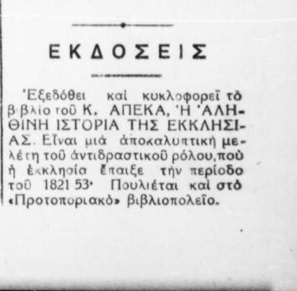
Σε αυτό τονίζεται πως «η θρησκεία και ειδικώτερα ο χριστιανισμός, που είνε η ανώτερη μορφή θρησκείας στα χέρια του καπιταλισμού είνε ένα γερό όπλο για το αποκοίμισμα των καταπιεζομένων μαζών». Οι κομμουνιστικές εφημερίδες σημαίνουν την κήρυξη του πολέμου όχι μόνο στην εκκλησία, αλλά και στη θρησκεία. Το Δεκέμβριο του 1932 κυκλοφορεί στον Ριζοσπάστη ένα σχετικό άρθρο του Κώστα Απέκα.
Μάλιστα οφείλουν την αντίθεσή τους αυτήν να «τη διακηρύττουν ανοιχτά και σε κάθε βήμα». Συνεπώς, «το επαναστατικό προλεταριάτο της Ελλάδας και το κόμμα του – το ΚΚΕ – πρέπει ν’ ανοίξουν διάπλατα το μέτωπο στο θρησκευτικό τομέα της αστικής ιδεολογίας». Καλούνται λοιπόν τα μέλη του ΚΚΕ να βάλουν τα θεμέλια στη χώρα «για ένα πλατύ αντιθρησκευτικό αγώνα, πολύ περισσότερο τώρα που η κεφαλαιοκρατία και το κράτος της διαθέτουν όλο και πιο πολλά μέσα για να τονίσουν το θρησκευτικό φρόνημα».
Αλλαγή στάσης Εκκλησίας και Αριστεράς
Το 1936 τα άρθρα, οι ανταποκρίσεις για όργια και παραβιάσεις ιερέων και οι επιθέσεις σε εκκλησία και θρησκεία έχουν εξαφανιστεί στον Ριζοσπάστη. Ο αντικληρικαλιστικός λόγος απουσιάζει. Πλέον η εκκλησία και η θρησκεία αντιμετωπίζονται ως ένα αναπόσπαστο κομμάτι της λαϊκής κουλτούρας και η κομμουνιστική Αριστερά αποφασίζει να το χρησιμοποιήσει και όχι να το πολεμήσει. Η στροφή αυτή θα συνδυαστεί με τις αλλαγές στην προσέγγιση του έθνους και του 1821 από το ΚΚΕ γύρω στα 1936, αλλά κυρίως θα εκφραστεί κατά τη διάρκεια του κινήματος του ΕΑΜ.
Από τον πρόλογο του Κώστα Παλούκη, Δρ. Νεότερης Ιστορίας
Περισσότερες πληροφορίες για το ζήτημα «Εκκλησία και Αριστερά» μπορείτε να βρείτε και στο βιβλίο «Η Αληθινή Ιστορία της Εκκλησίας»
Λίγα λόγια για τη Σειρά Lux Orbis των Εκδόσεων iWrite
Πορευόμαστε σε εποχές όπου τα σκοτάδια απλώνουν και πάλι απειλητικά τη σκιά τους πάνω από την ανθρωπότητα, σε κάθε πτυχή του βίου μας: πολιτική, κοινωνική, θρησκευτική… Στη χώρα μας τα φαινόμενα αυτά εμφανίζονται μεγεθυμένα, γεγονός που έχει καταφανέστατα επηρεάσει μία σειρά από παράγοντες που επιδρούν αρνητικά στην ιδιαίτερη ιδιοσυγκρασία και κουλτούρα μας.
Η Σειρά βιβλίων των εκδόσεων iWrite, με την επωνυμία Lux Orbis (Το φως του κόσμου), αποπειράται να αναδείξει προοδευτικές ιδέες σύγχρονων στοχαστών, μα και λαμπρά, λησμονημένα έργα από την εποχή της νεωτερικότητας (17ος-20ος αιώνας). Απώτερος στόχος των εμπνευστών της φρέσκιας αυτής εκδοτικής προσπάθειας είναι να θέσει στο προσκήνιο της Δημόσιας Σφαίρας την ανάγκη για τον ερχομό ενός Νέου Διαφωτισμού, ο οποίος με τη σειρά του θα μπολιάσει την κοινωνία με πληροφορίες και ριζοσπαστικές θέσεις που θα βοηθήσουν να σηκωθεί και πάλι ο Ήλιος πάνω απ’ την Ελλάδα.
